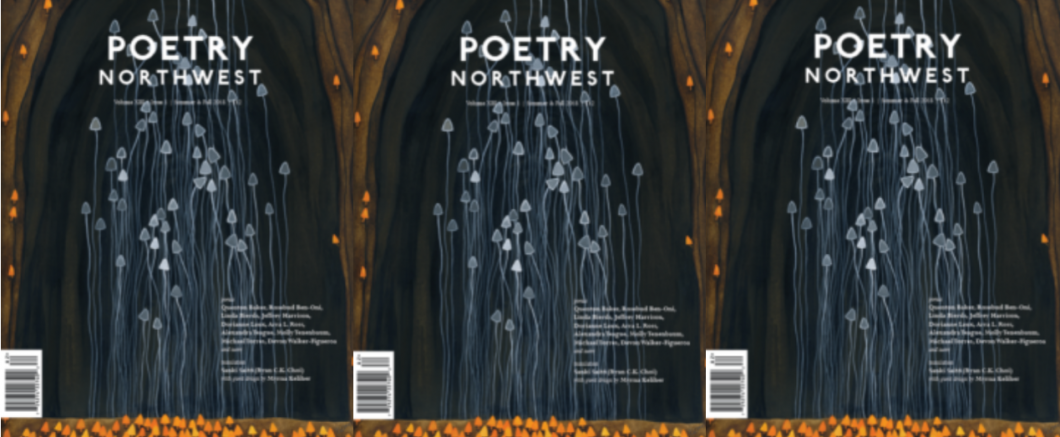In a society where we constantly apply filters to images, swipe on them, and leave comments underneath them, the collection of poems in the Summer & Fall 2018 issue of Poetry Northwest offers uncropped views of the realities often diluted in today’s world. The issue, although hailing from the northwestern corner of the United States, is comprised of poetry by more than fifty contributors from all over the country, and it features international voices, immigrant voices, as well as sections of translation to illustrate life in a world overrun with altered images.
For over fifty years, Poetry Northwest has provided a solid platform for regional, national, and international poets, including established and emerging writers. The Summer & Fall 2018 issue features poems in traditional forms and in free, experimental verses, each conveying our quotidian experiences in fine detail, detail that a screen might pixilate. There are poems about theology, poems about felled trees, about utopian dreams (dreams absolutely necessary in an era that, to some, feels dystopian), as well as poems about unanswered omens, necessary poems about consent, and brave poems written about death row, as if the poet were looking the undertaker directly in the face and writing poems anyway.
In the pages of Poetry Northwest, reading and writing is a way of encountering other people and of existing in the world. The editors have devoted a healthy section of the Summer & Fall 2018 issue to the Japanese poet Sanki Saitō (1900-1962), whose poems, translated by Ryan C.K. Choi, come with original Japanese script above the translations. These brief poems, ranging from just five to twenty words, read with the calmness of a doe standing still in a shallow creek, but the journal also communicates cries of dissent against borders and limitations. The words soar above borders—in the way that only words can—to ignore the physical boundaries set in place across the globe, to speak against the foggy borders that try to circumscribe the capacities of language. Rodney Gomez, a poet featured in the Summer & Fall 2018 issue, writes an anguished, bilingual depiction of the emigration of the speaker’s father. A short section of his poem, “Their Bodies a Xylophone,” reads:
Don’t go where you’re not wanted.
Which would rule out the world.
In the sun, laid out, their bodies a xylophone.
Mira lo que pasa cuando te metes
donde no debes. Look at what happens
when you want to feed your family.
This poem alone overcomes what our current politics cannot: a true, unfiltered human experience that both spans national borders and desegregates languages.
The poems in the Summer & Fall 2018 issue all leap into the concealed spaces of today, to explain in detail, with eyes open, what many fail to see through the screen of a phone. Nomi Stone, in her darkly humorous yet seemingly apt depiction of a summer day titled “Afternoon with My Theology Tutor,” writes, “To be unimaginable, / that too is dying. / Take away my cell phone. / Collect names of other transgressors.” The speaker is equating imagining with living, and she wants to be stripped of her cell phone; she wants to see the world the way it begs to be seen, and the way it deserves to be contemplated. On the other hand, Wayne Miller’s poem “Notes: History” describes phones in the context of coping:
I found the actual painting
in the Denver Art Museum,
blocks from where I’ve moved
long past my father’s death.
Not sure what else to do,
I took its picture with my phone.
The speaker of “Notes: History” is writing of loss that leaves one stunned and devoid of answers, and like “Notes: History,” many of the poems in Poetry Northwest are for reciting when you feel most alone, when in fact you aren’t alone because you’re accompanied and comforted by verse. These are the kinds of poems worth committing to memory, for when your phone battery dies, during a solitary walk through the city at night. But most importantly, these poems give the reader a tangible, indelible experience, a connection that lasts longer than a swipe or double click.
—
Scott Tschirhart is a reader for Portland Review and a full-time line cook.

